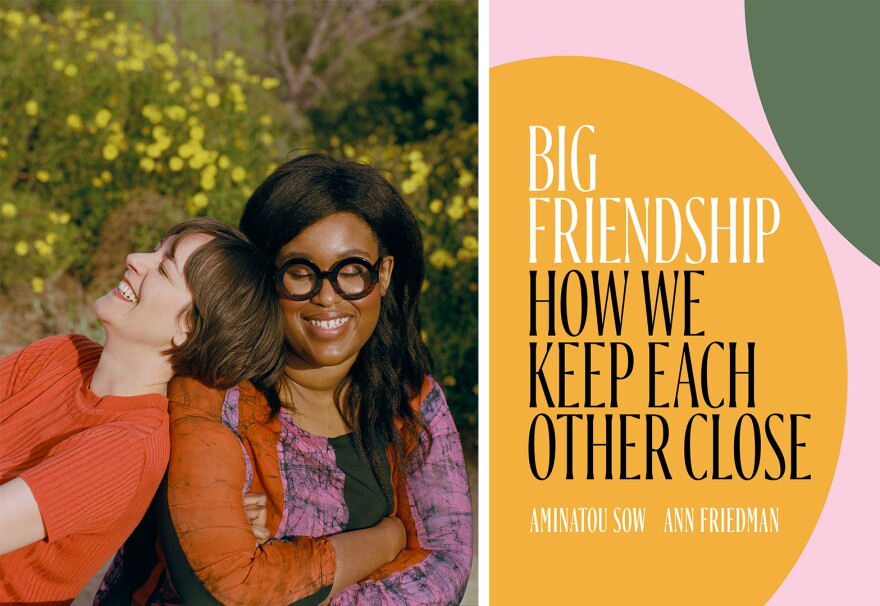Have a question you want to ask Dear Life Kit anonymously? Share it here.
Friendships are some of the most formative relationships in our lives, and they're also often some of the most complex. Friendship boundaries can be tough to define, and the path forward grows hazier the older you get.
How do you make and keep friends in adulthood? How do you deal with diverging experiences?
Aminatou Sow and Ann Friedman are friends, writers, the former hosts of the popular podcast Call Your Girlfriend and authors of Big Friendship: How We Keep Each Other Close, a book about maintaining their own friendship across time and distance. We asked them to answer your anonymous questions on friendship.

An acquaintance of mine really wants to become better friends, and I'm just not interested. How do I let them know? — Not asking for a friend
My policy usually is kindness, kindness, kindness. You don't have to tell someone something as negative as "I don't think our personalities mesh well," because the truth is that you've probably not spent enough time with this person to figure that out. So I will say that if you truly do not have time to hang out with this person, do not lead them on. Don't show up half of the time and keep them waiting the other half of the time.
But, truly, I would challenge this letter writer to go a little beyond that: If you think that truly this person has a personality you don't like, then forget about it. But if they're a kind of person you're not used to being friends with, you might ask yourself why that is and what you can do about that.
Having different kinds of friends and generally being able to get along with different kinds of people is an important life skill. It doesn't have to mean that you have a deep, intense friendship with everyone. But I would push you to ask yourself why you think this person would not be a good friend. — Aminatou Sow
I don't have kids, but a lot of my friends are starting to, and it feels like we have less in common. How can I keep up a meaningful friendship? — Bye Bye Baby
I love this question as a person who doesn't have kids and loves many, many friends who do.
I think the first piece of advice is, set an intention. Say, "I want to stay friends even though you're a parent now and I'm not." And I think this goes both ways. I think people who have kids should say, "Hey, let's stay friends." Sometimes we want to assume that the other person won't be interested in our lives now that there's this gap in experience, but honestly, I'm interested in my friend. That's not gonna change because they have this new, important relationship that's in their lives.
The second part is to stay genuinely curious about what that shift means. My eyes glaze over when I read an article about parenting, but when I hear about my friend's personal experience, a person I care about, I'm like, "Yeah, tell me more. Let's talk about it." And I expect the same thing from them in return.
And finally, ask for what you need from each other. If you're needing a more structured time to hang out or an earlier or later way of checking in, or a new hobby, or maybe it needs to feel like a long-distance friendship for a while, ask for what you need rather than just doing a Homer Simpson fade into the bushes. Talk about it. — Ann Friedman
Everyone I know has friends from decades ago. All my oldest friends have drifted away. I still reach out, but their responses come slower and slower. What's wrong with me? — Fading friendships
First, I want to say that it's really hard to make and keep friends even if they are people you've known for decades. It's still really hard. And so something embedded in this question tells me that you think it should be easy or that it's easy for other people, and I just want to start with that. It is hard, and it takes work for everyone.
Your "What's wrong with me?" question is so telling. Nothing is wrong with you. When people do not have time to get back to you or you feel that they're being terse or short, the question really is, "What's up with them?" And a lot of times it just means that they're incredibly busy and it usually doesn't have anything to do with you at all.
I think a better question to go back to your friends with is, "Hey, can we make some meaningful time to catch up?" Or "Can you tell me about what's keeping you busy these days?" I think people underestimate how much impact a direct question can have. They are probably struggling and going through the same tough stuff that you are and would love for someone to hear them out. — Aminatou Sow and Ann Friedman
Have a question you want to ask Dear Life Kit? Whether it's about friendship, family, work conflict or something else, share it here.
If you love Life Kit and want more, subscribe to our newsletter.
Copyright 2023 NPR. To see more, visit https://www.npr.org.




